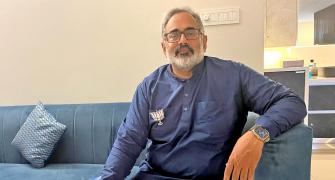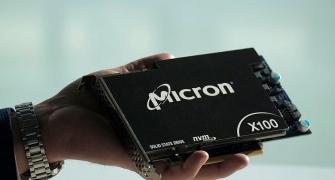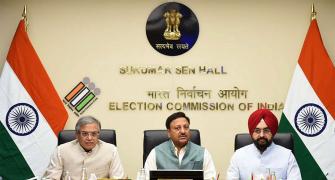Daphne,an Australian, feels more secure while flying these days. A frequent flier, she says it's her passport that has made her flying experience less stressful. She is referring to a new innovation for international travellers, an electronic passport (e-passport).
Whenever she presents it to the immigration officer, he/she simply scans and returns it. While the new passport looks the same as its predecessor, it has a microchip embedded in the centre page that contains her digitised facial image and personal details as they appear on the data page. The microchip is read electronically and there's little room for error.
The Indian government, too, is soon expected to invite tenders to deploy e-passports. The multi-million dollar project will initially provide e-passports to diplomats and, if successful, will be rolled out for close to 40 million passport holders across the country. Around 10 to 12 million passports are issued every year by regional passport offices.
The passport is an initiative by the the International Civil Aviation Organisation. The organisation has a membership of 186 countries and will set standards for the deployment of e-passports.
An e-passport is machine- readable, enabling quick processing at airports. The passport comes with an in-built security (biometric) features, which comprise an IC (integrated circuit) chip embedded in the back cover that stores the data (including photo). These also make the passport tamper-proof. In ordinary passports, this data is typically displayed on the photo page.
With almost 500 million passports in circulation and the cost of a single e-passport ranging between $8 and $15 (Rs 330 to Rs600), it has opened up a huge market for Indian IT firms.
IT companies such as Tata Consultancy Services, NXP Semiconductors and Gemini Traze are already in the fray.
NXP Semiconductors, manufacturer of radio frequency identification chips that are used in e-passports, claims to have cornered 80 per cent of this market.
Ashok Chandak, director sales and marketing, NXP Semiconductors India, says: "Currently, 45 countries have started the deployment of e-passports and globally the market is huge."
NXP manufactures these chips at its unit in Netherlands and Germany.
Chandak says that they possess the technology that addresses the regulatory requirement for the chips. The other contender is Gemini Traze, a subsidiary of Gemini Communications, that is the first Indian company to manufacture RFID tags in India. The fully automated tag manufacturing facility will have an annual production capacity of 100 million tags.
Pradhyumna Venkat, CEO, Gemini Traze RFID India, says: "We have been talking to a few countries who are in the deployment stage of e-passports. Most of these are in Europe. We are also looking for tie-ups with local partners in these markets." He believes that the e-passport market is huge but will take another three years to four years to mature.
"We are also looking forward to the tenders that the Indian Passport office will shortly issue for the pilot-test of e-passports," he added.
TCS is another company that is looking at this market. It has also developed an e-passport solution on the lines of guidelines worked out by the ICAO. The company has already bid for pilot projects in a couple of countries.
M Vidyasagar, executive vice-president and head, Advanced Technology Centre at TCS, Hyderabad, recently said: "We will either implement the software or provide machines that support it depending on the order placed by an airport authority," he said.
He refused to name the countries in which the company bid for e-passport projects and also did not disclose the names of vendors it had tied-up with for the product.
Without being specific, Vidyasagar also said the potential in this area was huge. Its use depended on the decision of individual countries on whether to switch to e-passports or not.







